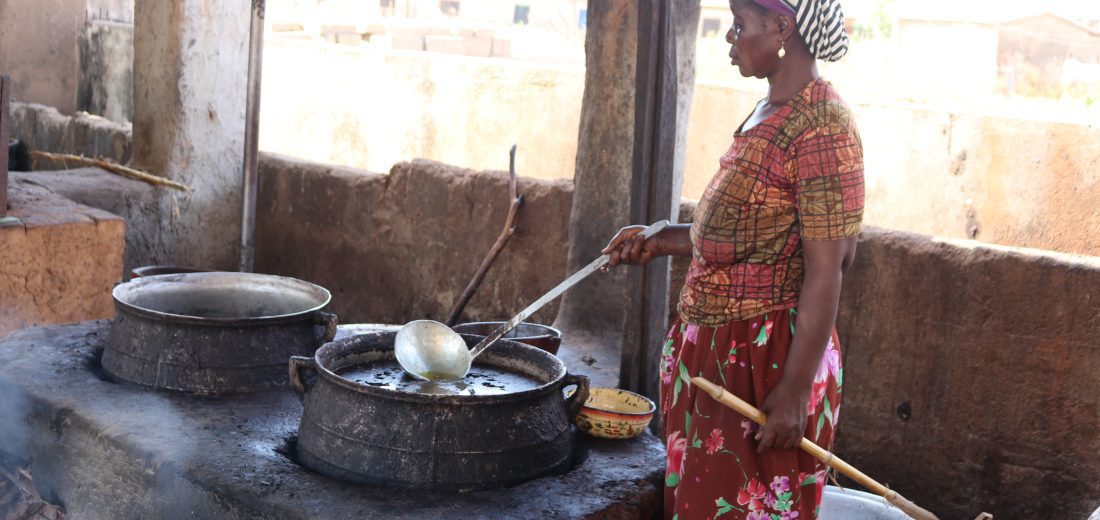
For generations, shea butter has been recognized as incredibly nourishing for the skin. For many Northern Ghanaian families, it is also a top income-generating product, as the trees can withstand unpredictable weather. As demand for it increases, since global brands use it for chocolates and creams, the threat of lockdowns and tree felling lurks.
Upon our arrival, we are taken aback by the clean suburban-like streets, colorful yellow-yellows (motorized tricycles), and motorbikes that populate the roads. Welcome to Tamale, Ghana’s third-largest city and an emerging hotspot for investment within West Africa. Many know it as ‘The city of shea butter and smocks’ – Ghana’s national outfit. ‘Would you please bring me some shea butter?’ is a common request from friends when traveling to these parts. The beauty products are always in demand, but what exactly is shea butter?
About Shea Butter
In a nutshell, it is the fat extracted from the nuts of the shea tree. It is solid at room temperature, has an ivory or off-white colour and has been used in cosmetics for centuries. Most shea butter still comes from West Africa, where the trees originated. Its high concentration of vitamins and fatty acids, combined with its easy spreadable texture, make it ideal for all kinds of skincare. And you can even cook with it.
It was in great demand on the world market thanks to its wide range of uses: as a replacement for edible vegetable oils and within the beauty industry. This was until the Covid pandemic broke out and the import and export of goods were curtailed. Women from the northern part of Ghana – where Tamale is located – who lived entirely off the production of shea nuts, were extremely affected.
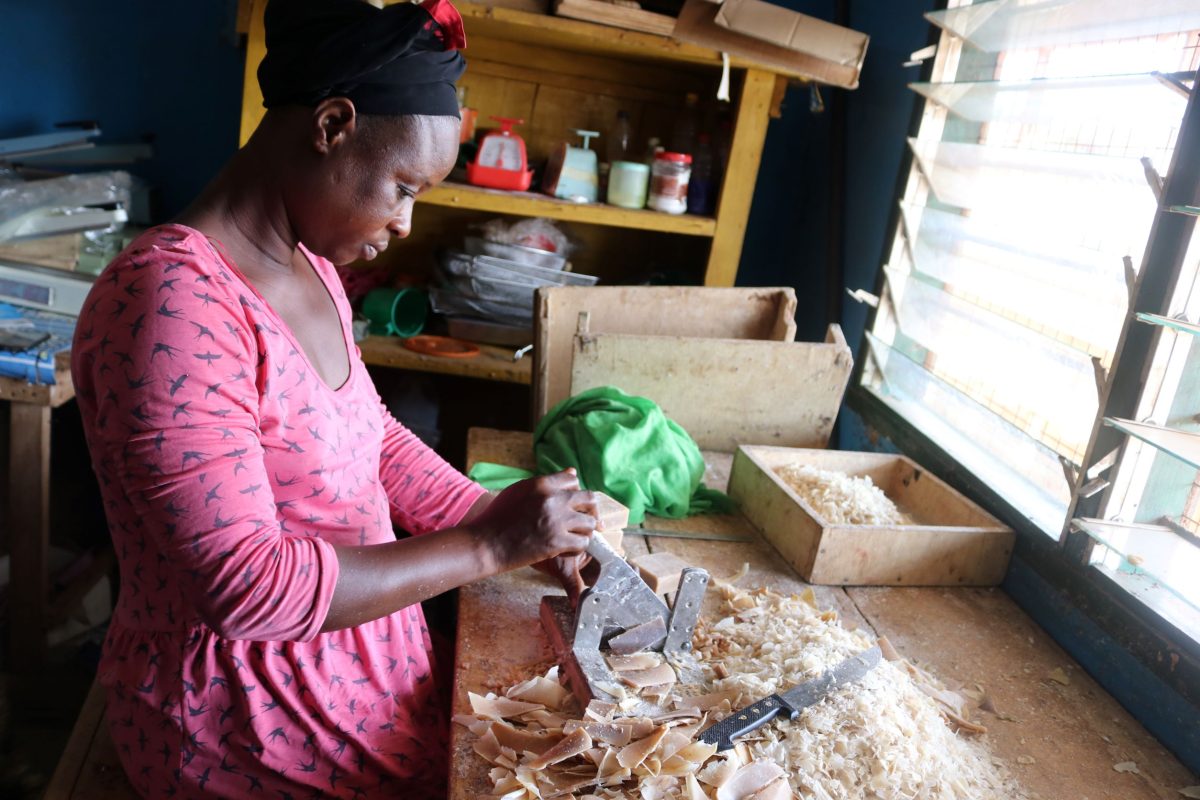
Fortunately, organizations such as the Pure Trust Social Investment Fund (PTSIF) came to their aid. They were trained to turn shea butter into soap or cosmetics, entirely by themselves, for the local market. According to a report by the Inclusive Business Action Network, shea butter processing is the main source of income for women in the region, underlining the value of shea trees.
‘If You Love Women Love Shea Trees’ Campaign
From Senegal in the west to Ethiopia in the east, the threat to shea trees has become an urgent issue. In Ghana, the PTSIF has taken the lead in campaigning for their protection. They are regularly cut down by poor cash-strapped farmers for charcoal, thus threatening the livelihood of many women. Many shea trees are also felled for clearing land so that buildings can be constructed. These practices not only harm the women and their families but even the national economy.
‘With the advent of Covid-19,’ says Habib Haruna, the managing director of PTSIF, ‘the shea butter industry faced a drop in demand, due to lockdowns, causing the majority of women to shut down production. A disruption of that magnitude results, economically speaking, in widespread poverty – which can ruin many households. We took the initiative to have outside experts train the women to make different kinds of products: soap, mosquito repellent, and shea cream for the body, for their own use, and for the local market. In this way, we were able to enable many women to continue supporting themselves. That is how essential shea trees are.’
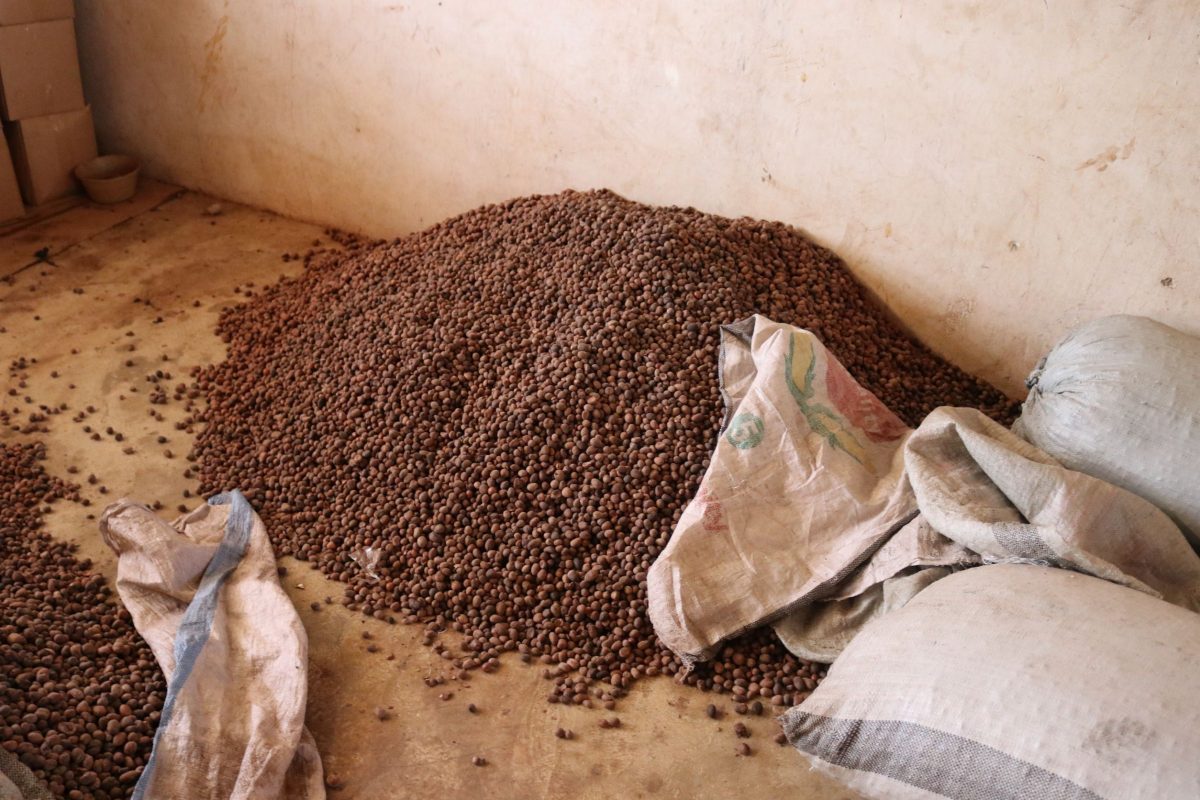
That is precisely why his organization started the campaign to save them. ‘According to researchers, shea trees take ages to grow,’ Haruna explains. ‘If you plant the seedlings, they often fail to reach maturity – and if they do, it takes up to twenty-five years for them to mature. So protecting the existing trees is the absolute best thing to do. They can withstand difficult weather conditions very well; the more of them we have, the more shea nuts we can harvest, whatever the weather. That is why we are really fighting to save them, by creating awareness about them. A loss of shea trees is a loss of income for hundreds of families, especially for women who depend on them.’
The Pure Trust Social Investment Fund is currently running a campaign christened ‘If you love women, love shea trees.‘ It believes that protecting the trees is a collective responsibility and if everyone responds to it, women and children will have opportunities to a better livelihood.
Equipping the Women with Skills
Through PTSIF’s partnership with the PagSung Shea Butter Processors and Shea Nut Pickers Association, women groups from different districts of Tamale could be trained in quality shea butter production. The partnership is a cooperative enterprise that aims to promote financially disadvantaged women from the northern part of Ghana, which is already the poorest.
‘In the beginning,’ says Safia Hassan, the 62-year-old manager, ‘we did several things, including sewing. But making shea butter turned out to be the most lucrative, so we put everything into that.’
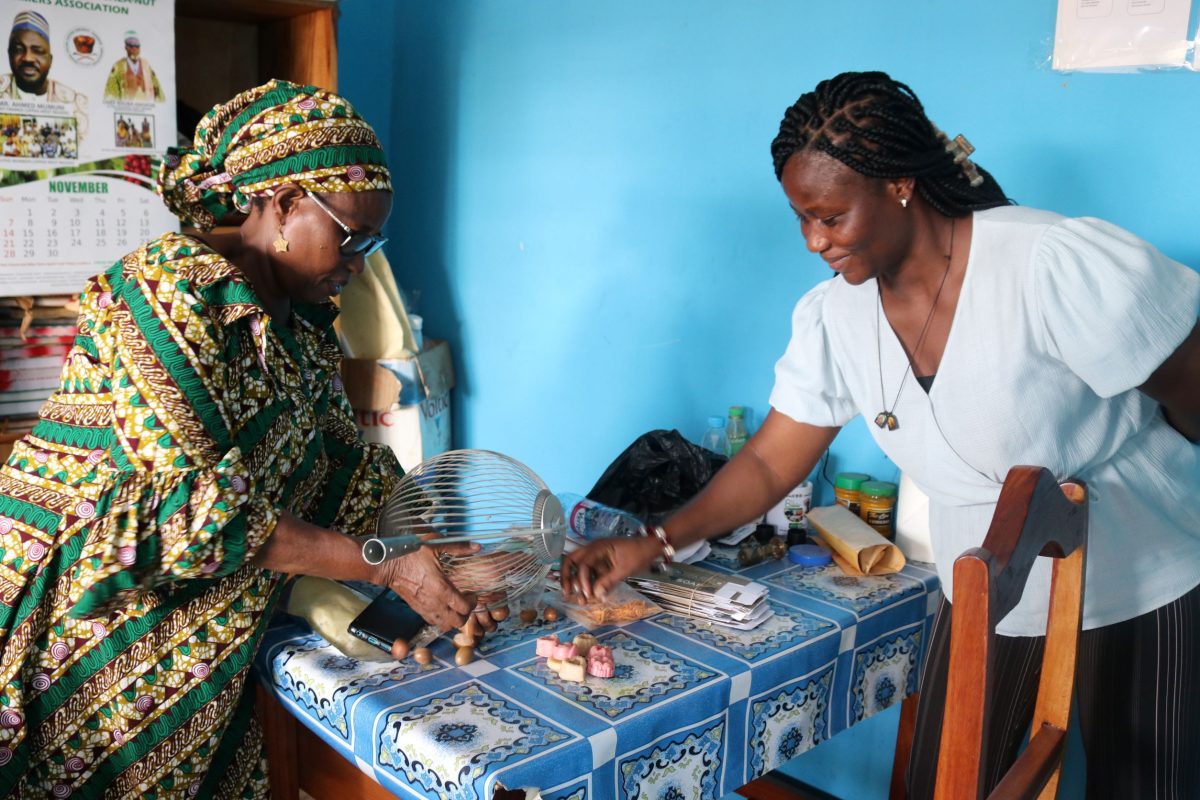
During the tour, we see more than fifty women doing all sorts of tasks: some busy with the seedlings, others with pieces of soap, but the women cooking the butter stand out the most. It is a scorching hot day and the fact that they are hanging above the pots in the scorching afternoon heat is a sign of great resilience – you could even call it awe-inspiring. Often, it is the women from the village who will collect the nuts and make them into butter: shifting, washing, drying, grinding and boiling; not a step can be missed. And they derive satisfaction and self-esteem from it.
‘After the training, they could make the butter at home,’ says Safia Hassan, ‘but unfortunately they don’t have the right facilities to deliver top quality products. That is why most of them come here. Every time there is a big order, we ask them to add what they have made at home. That way they earn a little more.’
‘The cooking process is super intense,’ says one of the women. ‘We smear shea butter on our skin, that way it becomes heat-resistant – and stays soft and smooth underneath,’ she jokes. ‘Well, cooking the butter has become quite a challenge,’ Hassan continues, ‘as the ideal method is lacking. We understand that climate change is becoming a real global problem, so from now on we’re foregoing charcoal and firewood, which are the major culprits, but it does make our work more difficult.’
Shea Cakes
Forced to look for alternative forms of energy, the women of PagSung arrived at what they call ‘shea cake.’ ‘After extracting the oil, a residue is left behind which we always keep. It is a tedious job and takes some time, because we do it by hand: desalinating the water and making the residue into little balls. So we call them “cakes” and use them instead of charcoal for heating – although it is not enough for the whole cooking session, so we still need some firewood or gas, which is very expensive.’
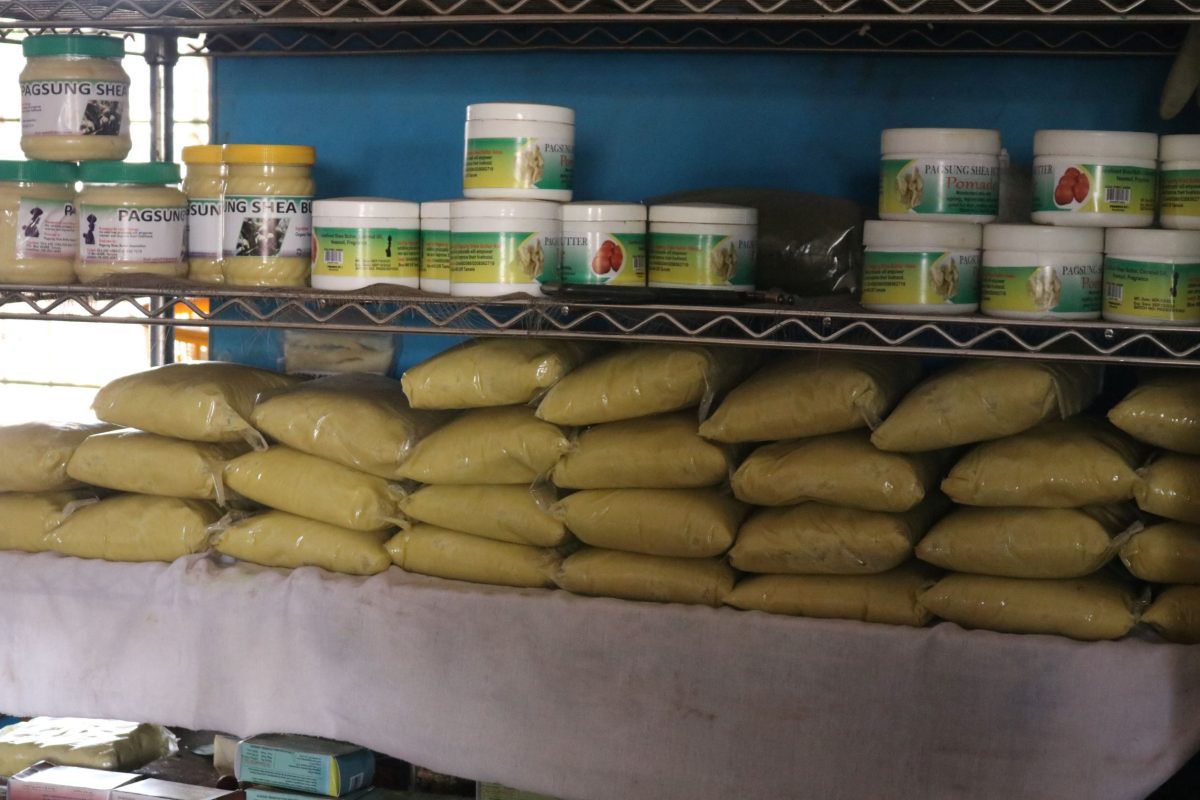
If the organization could get a decent machine to turn the shea cake into energy, Safia Hassan believes it would be a great, revenue-generating move that adds value to the shea production. The traditional production process requires a lot of energy and creates a lot of organic surplus, which could be put to better use.
Witnessing the Impact
We hit the road again, this time to a processing site set up by the Pure Trust Social Investment Fund. The sight of round huts with conical thatched roofs along the roadside is a clear indication that we are heading towards a remote village. After two and a half hours on bumpy dirt roads, we arrive at Kilampobile Shea Butter and Processing Centre, in the village that gave it its name.
Enthusiastic women provide a warm welcome – most are elderly but still working the land. ‘This piece of land was given to them by the chief of this area, for free,‘ says Alhassan Abdallah, the regional PTSIF leader. ‘They were interested in a group project and ideally they wanted to do some cultivation. It measures one hectare in total and each woman has her own part, where she grows what she wants.’
One of them is Dombatey Maalin-Ere, a 42-year-old mother of three, with one at the university. Thanks to her work at the processing center, she has been able to support her family and pay for school fees. ‘Before I fully immersed myself in this,’ she says, ‘I used to burn charcoal and make local brew. Neither of them was easy, but I had no choice. My life has become so much easier since Pure Trust started this shea nut center because I used to have to walk three kilometers to get my shea processed. We received training and now I can also make other products, such as cosmetics.’
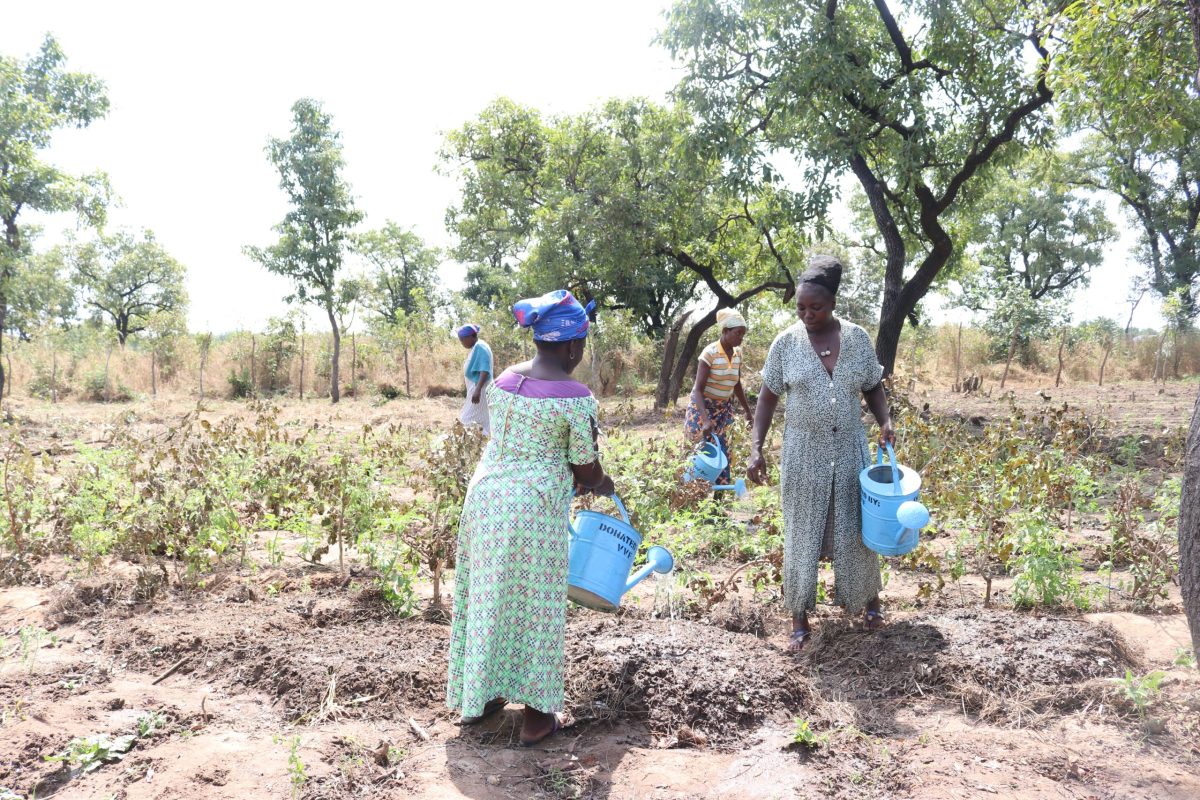
‘We have learned the importance of trees, not just shea trees. As a women’s group, we are in the front line of protecting them. Look around and you’ll notice that we have included many trees on our farm, especially shea trees. We also impressed upon our chiefs that those who engage in charcoal burning should refrain from cutting down shea trees. If we see anyone cutting them down or destroying them, we report it immediately to the chief. Shea butter production has real value and we call on everyone who burns charcoal to join us, because together we will be able to do even more.’
Apart from the energy source, lack of capital has also been a major obstacle. ‘We suffer from poor infrastructure and limited resources, which often leads to inferior products. We have many problems, but we are trying to cope with most of them. Capital is what is needed most, to ramp up production and double our income – which will take away many of the problems,’ Dombatey admits.
According to Safia Hassan, another issue is the lack of proper certificates, which means they are not yet allowed to export. ‘Getting those papers takes a lot of time and money,’ she says, ‘which we cannot afford at the moment. Our only option is to sell to companies that are certified, to which they put their brand name on it and export it abroad. This makes them a lot of money, but when it comes to paying us, they do it at their own discretion. In the end, we work hard but earn very little. The support that would help us tremendously right now is to get the certificates so we can export ourselves – and increase the women’s wages and provide more jobs.’
Inspiring Younger Generations
Fuseina Akakpo, who studies Education at West End University College, is a happy young woman and active in the shea business. She is the secretary of one of the women’s groups supported by Pure Trust. ‘It makes me proud to belong to these women,’ she says, ‘who I always think of as my mothers. I provide the secretariat for the Ntereso community and I am the overall spokesperson for all the women groups, because I am the only one who is well-educated among them. I am a native so witnessing their drastic change, because they have been enabled to do so, is wonderful – and motivates me immensely. The people here depended on cultivation but because of the unpredictable weather, this was not a sustainable practice. After the training in making different shea products, I saw many women flourish.’
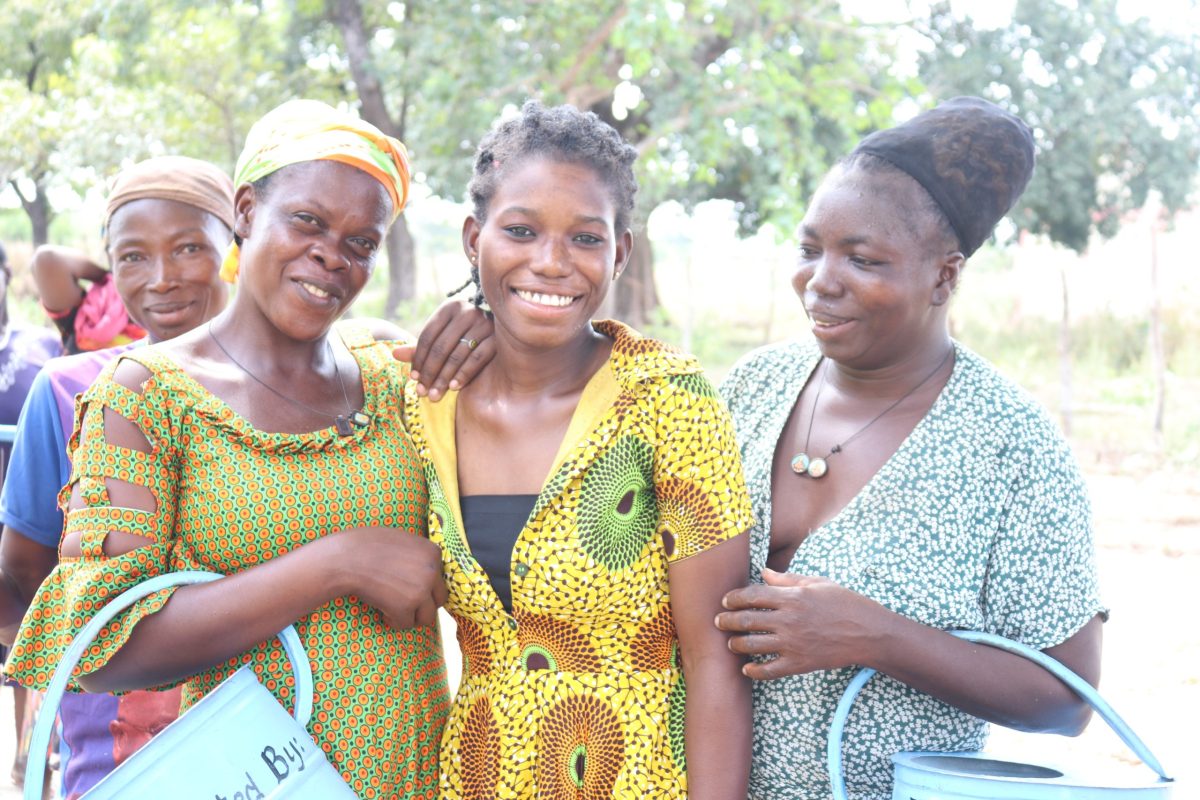
She has come a long way, having been brought up in a modest home by a fisherman father and a mother who traded the fish he caught. She started earning some extra money at an early age, even before she got her diploma. ‘At first, like all the other women, I could do nothing but make shea butter. But now, I can make several different products, sell them and support myself from that,’ she says with pride. What inspires her most is that the women she works with can now send their children to school with the money they earn from the butter.
While many choose to go to the city and take office jobs, Fuseina Akakpo has found her happiness in the local shea world – and hopes to have her own factory one day. But first she has to finish university and become a ‘renowned teacher’ she says. Until then, she will still maintain her passion in working with women in shea butter production and protection of their golden treasure – the shea trees!
-
Francisca
19.04.2022This is a very informative article.
Beautiful work. -
DFatimah
11.05.2022Blessings to all the Women and their families. God bless you all and bless the Shea trees!
-
Jeremiah
12.05.2022While you were at Pagsung, did you learn of any improved Shea roasting equipment being developed?

Leave a Reply